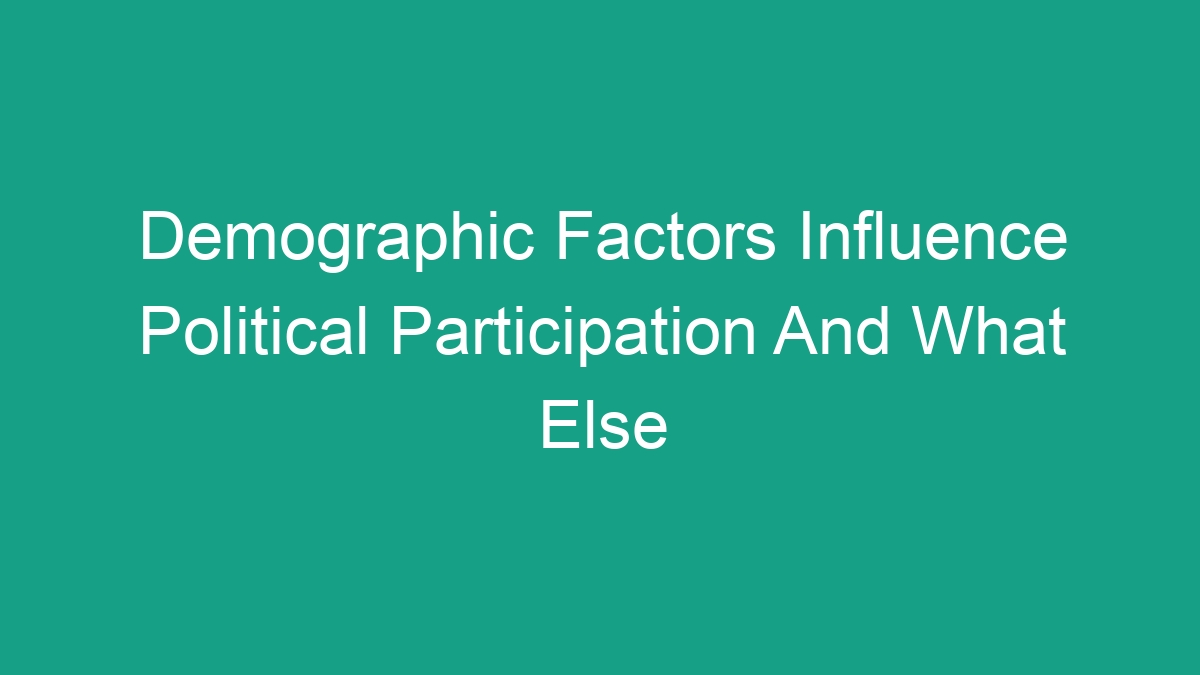
The Impact of Demographic Factors on Political Participation
When it comes to political participation, demographic factors play a critical role in influencing an individual’s engagement in the political process. These factors can include age, gender, education, income, race, ethnicity, and more. Understanding how these demographic factors impact political participation is essential for creating a more inclusive and representative democracy.
Age
Age is a significant demographic factor that influences political participation. Research has shown that older individuals are more likely to participate in political activities such as voting, contacting public officials, and attending political rallies compared to younger individuals. This can be attributed to a variety of factors, including life experiences, greater understanding of the political system, and a sense of civic duty that comes with age. On the other hand, younger individuals may be less likely to participate due to a lack of political efficacy, fewer resources, and less experience with the political process.
Gender
Gender is another demographic factor that can significantly impact political participation. Historically, men have been more likely to participate in politics compared to women. However, in recent years, there has been a shift as more women have become actively engaged in politics and are participating at higher rates. Despite this progress, gender disparities still exist, and women continue to face barriers such as gender bias, unequal representation in government, and societal expectations that may hinder their political participation.
Education and Income
Education and income levels also play a critical role in shaping political participation. Research has consistently demonstrated that individuals with higher levels of education and income are more likely to engage in political activities. This is often attributed to the fact that higher education and income provide individuals with the resources, knowledge, and confidence to participate in the political process. Conversely, individuals with lower levels of education and income may face barriers such as limited access to information, financial constraints, and feelings of disenfranchisement that can hinder their political participation.
Race and Ethnicity
Race and ethnicity are additional demographic factors that influence political participation. Research has shown that racial and ethnic minorities are often underrepresented in political participation relative to their white counterparts. This can be attributed to a range of factors, including historical discrimination, language barriers, lower levels of trust in political institutions, and disparities in access to political resources. Efforts to address these disparities and increase the political participation of racial and ethnic minorities are crucial for creating a more equitable and representative democracy.
Other Factors Influencing Political Participation
In addition to demographic factors, there are several other key factors that can influence political participation:
Political Efficacy
Political efficacy refers to an individual’s belief in their ability to influence the political process. Individuals with high levels of political efficacy are more likely to engage in political activities, such as voting, volunteering for campaigns, and contacting public officials. On the other hand, individuals with low levels of political efficacy may be less inclined to participate due to feelings of powerlessness and a lack of confidence in their impact on political outcomes.
Access to Information
Access to information plays a critical role in political participation. Individuals who have access to a diverse range of political information, including news, analysis, and political discourse, are more likely to be informed and engaged participants in the political process. On the other hand, individuals with limited access to information may face challenges in staying informed and may be less likely to participate as a result.
Trust in Political Institutions
Trust in political institutions is another important factor that can influence political participation. Individuals who have a high level of trust in political institutions are more likely to engage in political activities, such as voting and contacting elected officials. Conversely, individuals who have low levels of trust in political institutions may be less likely to participate due to feelings of disillusionment, apathy, and distrust in the political system.
Community and Social Networks
The communities and social networks in which individuals are embedded can also influence their political participation. Individuals who are part of politically active and engaged communities are more likely to participate in political activities. These communities can provide social support, encourage political engagement, and facilitate opportunities for participation. In contrast, individuals who are not part of politically active communities may face barriers to participation and may be less likely to engage in political activities as a result.
Conclusion
In conclusion, demographic factors play a significant role in shaping political participation. Understanding how age, gender, education, income, race, and ethnicity impact political engagement is essential for creating a more inclusive and representative democracy. Additionally, factors such as political efficacy, access to information, trust in political institutions, and community and social networks also influence political participation. By addressing these factors and working to reduce disparities in political participation, we can strive towards a more equitable, informed, and engaged electorate.



